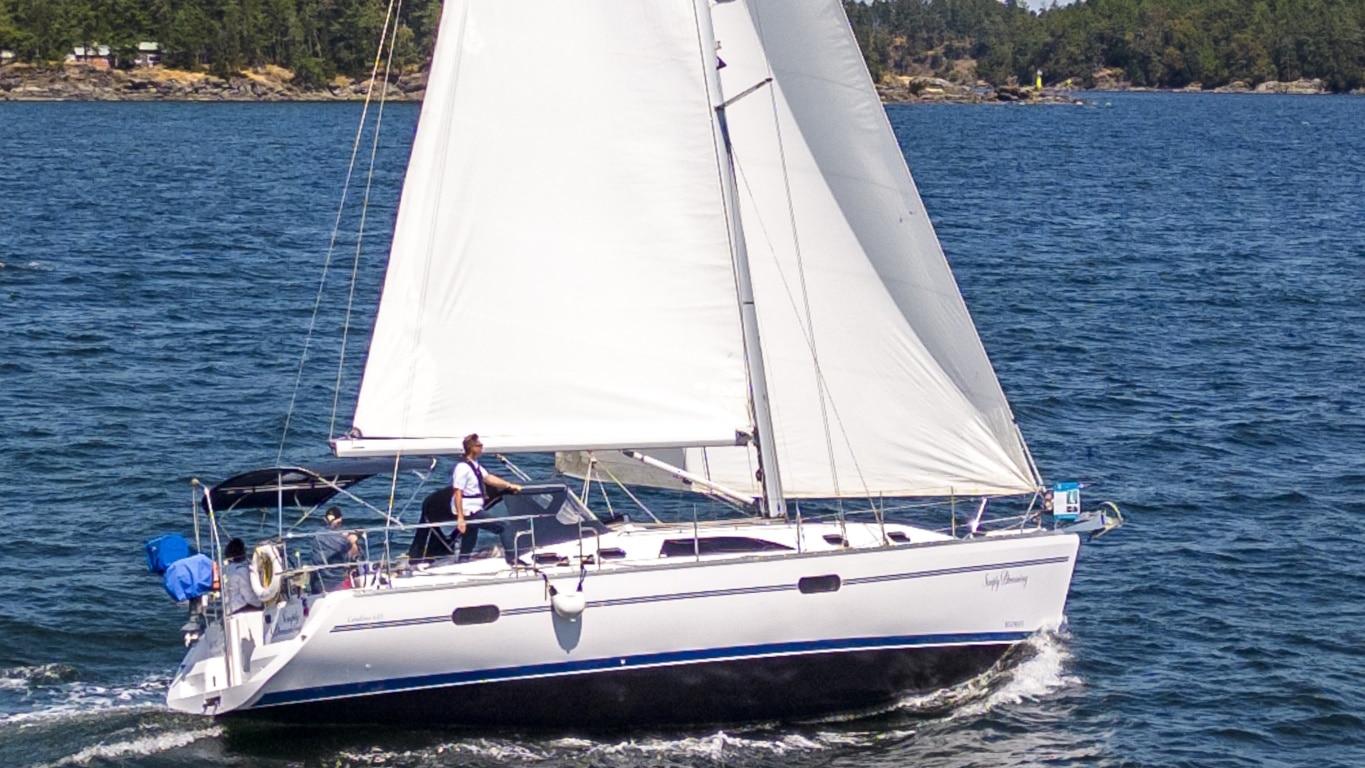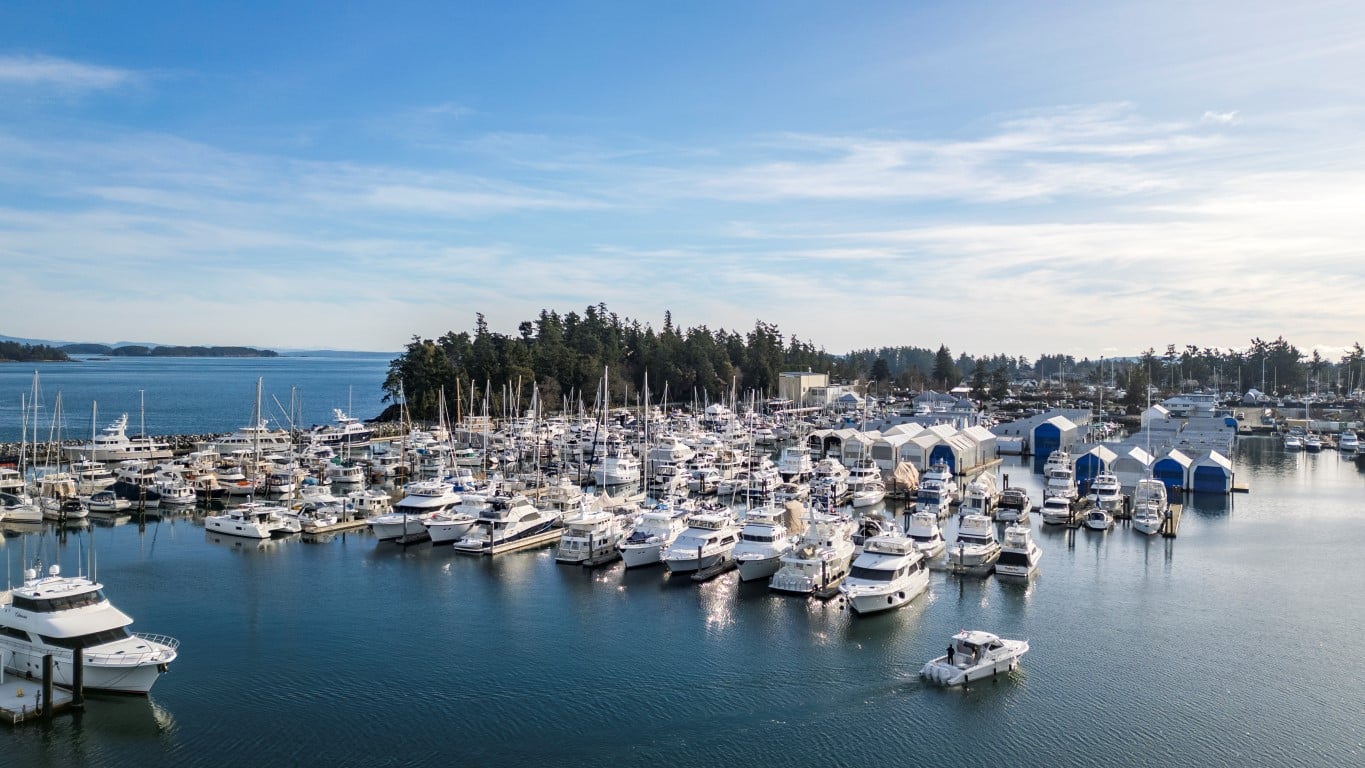A Guide to Green Boating – Tips for Boaters With an Environmental Conscience
For boating enthusiasts, simply being on the water brings us joy. However, with that pleasure comes the responsibility to protect the marine environment and preserve it for generations to come.
The good news is, adopting green boating habits isn’t difficult. Just like the simple steps you’ve taken to be more environmentally friendly on land, green boating can be achieved by making a few changes to your usual routine.
Does Sailing Cause Pollution?

It’s important to recognize that what we do in and with our boats has an impact on aquatic environments.
Over 700,000 boats sail in the British Columbia waters each year, and each of them has the potential to cause environmental damage through:
- Sewage and greywater dumping: Human sewage often ends up overboard in a scenario where the boat doesn’t have proper systems to store and treat it, or some kind of leak or failure occurs. Greywater represents a range of wastewater, from showers, sinks and other water sources, which is often contaminated with grease, soap and food debris. Sewage and greywater can pollute food sources while harming wildlife and the environment.
- Fuel and oil spillages: Fuel and oil spills are scary, with half a litre of oil able to produce a slick one acre in size. These materials can wreak havoc on the wildlife and coastal communities. Whether ingesting fuel or simply swimming through it, animals can suffer life-threatening damage from a little spill.
- Garbage pollution: Anywhere that humans go, garbage follows. And unfortunately, taking the boat on the water is no exception. Plastic and other garbage are often dumped overboard, along with less obvious pollutants like food scraps and packaging, glass bottles and boat system residue. Marine life often mistakes human garbage for food, which can end up being unhealthy or even life-threatening.
- Gas emissions from engines: All boat engines – but especially diesel engines- produce harmful emissions that contribute to all kinds of environmental damage. These include sulphur dioxide, carbon dioxide, nitrogen oxides, carbon monoxide, and hydrocarbons. Plus, older vessels can discharge up to 25% of their fuel directly into the water.
- Chemical pollution from cleaning products and paint: Chemicals and cleaning products can cause harmful algae blooms and poison sea life. Toxic metals like copper, plus common chemicals like phosphates, chlorine and ammonia, are all known to harm wildlife and impact food chains.
- Noise: A sailboat with an onboard engine can cause plenty of noise underwater, disturbing local wildlife. Through the rapid formation and collapse of bubbles created by the propeller, the sailboat can produce low-frequency noise that travels surprisingly far underwater. Even with the engine off, a boat moving through the water is enough to create a low-frequency disturbance, which is compounded in the presence of other boats.
The good news is, there are lots you can do to be a greener boater – and if everyone takes a few small steps, it will make a big difference to the health of our marine environment.
How to be a Green Boater

Protecting the marine environment and practicing sustainable boating does require some effort. Use the green boating tips below to get started:
1. Prevent Oil Spills
- Practice safe fueling – fueling spillages cause much of the oil pollution in our waters. To prevent drips, use an absorbent bib or collar. Fill your tank slowly to a maximum of 90 percent full to allow for expansion. Regularly check your tank and lines for damage.
- Keep your bilge clean – spilled oil, fuel, and other toxic liquids build up in your vessel’s bilge area and can spill into the ocean. Use absorbent pads and pump out into a designated bilge pumping tank when required.
If you have an oil or fuel spill, notify the marina or the Coast Guard immediately, no matter how small it seems.
2. Stop Pollution
- Dispose of sewage and untreated water safely – black and gray water contains pollutants and soap residues which can impact water quality, poison marine life and encourage algae growth. In Canada, it is illegal to dump sewage within 3 nautical miles from shore.
- Bring your general waste back – Over 17 billion lbs of plastic enter our oceans each year. Do your part in reducing plastic pollution by bringing all of your garbage back to the dock.
Use designated sewage pump stations, garbage and recycling facilities at your marina to dispose of waste products. The Georgia Straight Alliance’s Green Boating Guide contains a list of marinas with designated sewerage pumping facilities around Vancouver Island and the southern BC coastlines – including Van Isle Marina in Sidney.
- Use non-toxic cleaning products – phosphorus and nitrogen in some cleaning products may dissolve grime, but they damage the marine ecosystem. Clean your yacht regularly with fresh water to prevent dirt build-up; research eco-friendly cleaning products (or make your own) and follow the dilution instructions.
- Choose non-toxic bottom paint – copper in the bottom paint leaches toxins into water as it dissolves. Aluminum-based paint is one more eco-friendly option.
3. Reduce your environmental impact
- Reduce fuel use – reduce your speed, don’t idle and consider upgrading your engine. You’ll use
less fuel, which reduces pollution and saves money too. - Have a regular maintenance routine – tuning up your engine will increase efficiency and catch issues before they can cause environmental damage. Remember to do boat maintenance on dry land to prevent leakage into the water.
- Upgrade your engine for lower emissions – traditional 2-stroke engines lose up to 25% of unburned fuel directly into the water. Change to a Direct Fuel Injection, a 4-stroke or an electric engine to reduce fuel loss, reduce pollution and save on gas costs.
- Be aware of wildlife – a moving boat is loud and disturbing for wildlife. When you’re boating in an area near shore or around lots of wildlife, the best thing you can do is reduce your speed and maintain a safe distance. Use nautical charts and binoculars to observe wildlife while doing your best to avoid.
- Be mindful of how you anchor – anchoring can be seriously destructive to the environment, with the ability to wreck coral reefs and sea beds when they drag through the water. Do your best to avoid these sensitive areas while minding the length of your chain and warp to reduce drag. And if you think your anchor is dragging, lift it up right away.
4. Make the switch to renewable energy
Boating enthusiasts and manufacturers are at the forefront of finding ways that renewable energy technologies can reduce the environmental impact of boating.
Instead of idling your engine to charge electrical items on board, consider generating your own electricity by installing renewable energy technology, such as:
- stand-alone solar panel
- wind generator
- water generator
Check out Sailors for the Sea’s Green Boating guide for more comprehensive advice on environmentally friendly sailing.
The Future of Green Boating

Imagine taking a ride on a boat which is almost silent, doesn’t vibrate with engine rumbles and produces no emissions. These things are possible thanks to rapidly developing electrical engine technology, including:
- Electric outboard motors – these motors are charged via an electrical hookup at the dock and can provide the speeds and longevity most boaters require.
- Hybrid vessels – these vessels combine a traditional combustion engine with an electric engine, providing the ability to reduce environmental impact while retaining the reassurance of a traditional engine if needed. High-performing boats are increasingly being powered this way, including superyachts.
- Solar-powered boats – solar panels are used by many boaters to power onboard equipment, but new technological advances mean boat builders are now able to design vessels entirely powered by the sun!
- Better fuels – fuels are one of the biggest polluters on board. But alternatively, carbon-neutral fuels like biofuel, methanol and e-methanol are making serious strides.
- Enhanced design – boat builders are learning new and better ways to design boats, including efficient hull shaping and foiling technology, which can limit drag and boost fuel efficiency.
- Greener materials – as technology advances, along with new materials for construction, boat manufacturers and repair shops are able to prioritize non-toxic building materials. Biodegradable cleaning products are also spread far and wide now, which boaters can bring on board in place of the toxic stuff.
Van Isle Marina Supports Environmentally Friendly Boating

Recognizing that what we do in our boats can impact the waters we love sailing on, Van Isle Marina is proud to offer services to support environmentally friendly boating. Located in Sidney, BC, the marina has a full-service haul-out facility to enable out-of-water cleaning and maintenance. Power washing and bottom painting facilities and services are offered. Our state-of-the-art fuel dock includes a holding tank pump-out, and we offer complete garbage and recycling facilities on site.

